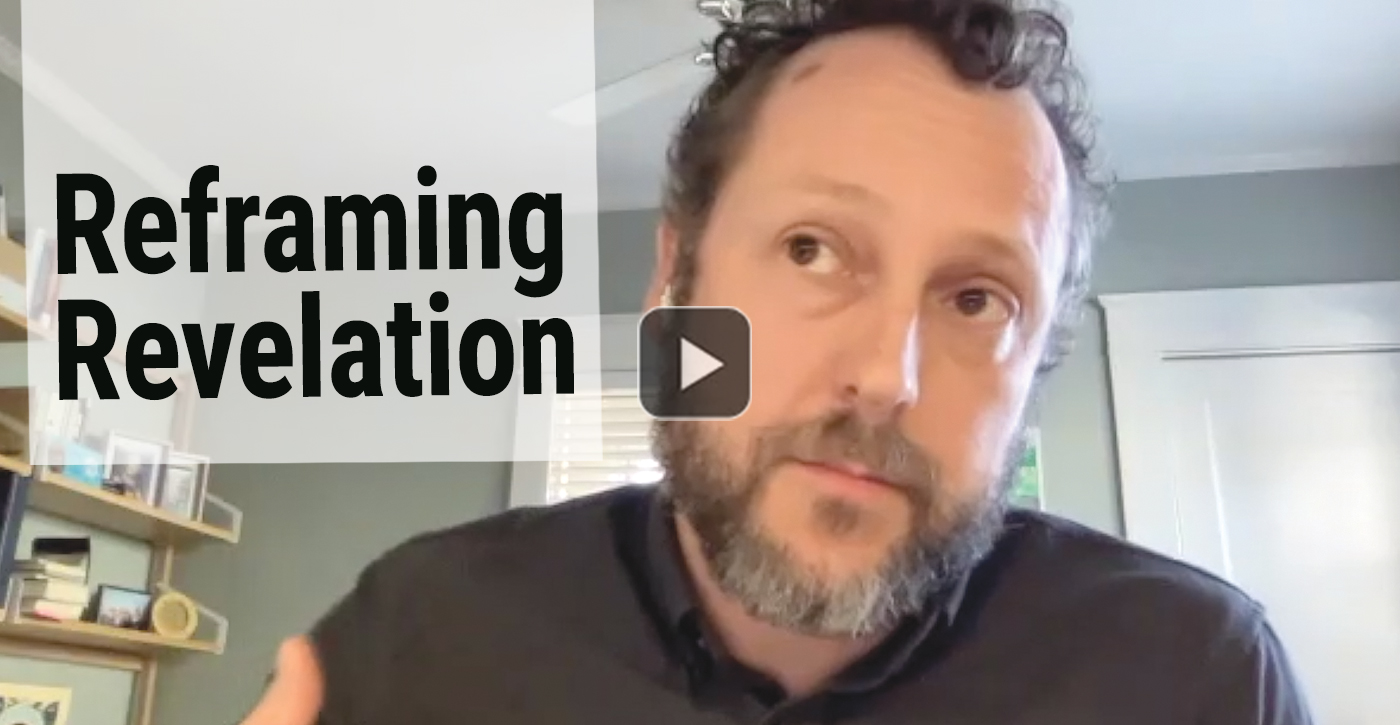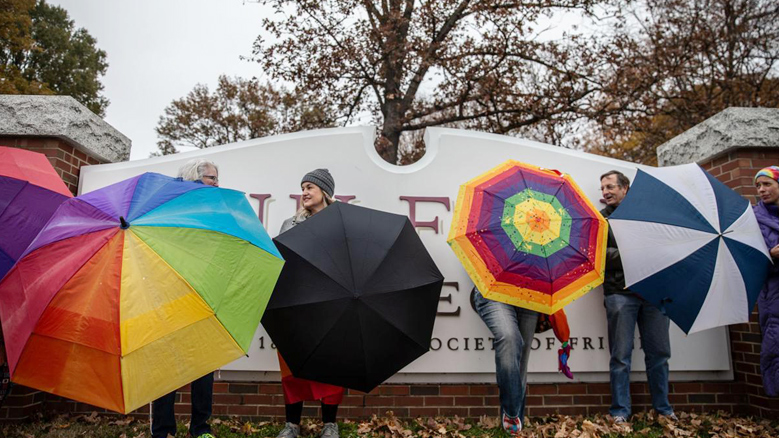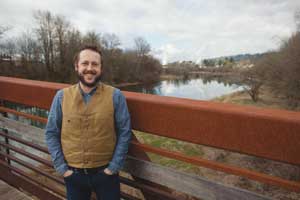
Before we can make plans for how to revitalize our meetings, we have to know what they’re for. This might sound silly. They’re for spiritual community.
But really, why do we start meetings? Why do we keep them going?
I was having a chat with C. Wess Daniels from Guilford College. He used to be the pastor at Camas Friends Church in Camas, Washington. For reference, I’m over in the Liberal unprogrammed side of things. I was, well, kvetching, to be perfectly honest. Sometimes Friends fret over whether Quakerism will or won’t survive. Sometimes I see someone say online that it’s fine if Quakerism doesn’t survive. Perhaps we’ve outlived our usefulness to the universe or to God. On the one hand, I agree that if our sect’s continuation serves no purpose, then it would be reasonable for God to invest energy elsewhere. On the other hand, not serving God’s purpose seems like something we have the power to change.
Commission and Commandments
If you ask most churches about their mission or vision (that is, how they serve God’s purpose), you will get an answer that reflects the Great Commission (go and make disciples), the Greatest Commandments (love God and love your neighbor), or a combination thereof.
This language and these ideas might seem outdated or irrelevant to some Friends. However, Rufus Jones once wrote:
The [healthy] mystic does not exalt his own experiences over historical revelation, he rather interprets his own openings in light of the master-revelations. He does not foolishly conclude because he has a vision of his own, that “the glory of God in the face of Jesus Christ” is outdated and unnecessary.
So, neither the commission nor the commandments have been overturned for Friends. How well are our meetings as covenant communities doing at those?
Commission: Outreach
George Fox wrote in his Journal, “the Lord let me see in what places he had a great people to be gathered.” If we’ve got a great people to be gathered, we’re going to need to do the work of inviting people in and making them feel welcome.
I came across an interesting statistic. A study by Thom S. Rainer, The Unchurched Next Door, found that 82 percent of people who don’t attend more than five religious services per year said they’d be up for accepting an invitation to one. Turns out, they’re just nervous to walk through the door without a buddy. I’ve seen my brother get pulled into an altar call without knowing what it is, so I can confirm that trying a new faith community is scary.
We’ve been having more conversations about this in the Quaker blogosphere in the last year. I know a lot of folks say we should just let our Lights shine and people will be attracted to us. While I’ll come back to that in a bit, I would like to encourage Friends to explore the work of the Quaker Religious Education Collaborative, which has been working on how we teach people what it means to be a Friend: how we make disciples. They’re creating and collecting resources for religious education of both children and adults. We don’t have to reinvent the wheel in every meeting.
Commandments: Love
I’ll leave your position on loving God up to you. I know some people aren’t too into “God talk.” A lot of us who are into it would say that communing with the Spirit during meeting for worship is one way we love God. But the other commandment, loving our neighbors: how well do we do on that?
Now, I don’t know if this is fair, but here’s the impression I tend to get. Most churches are very invested in solving immediate needs. They’ll give you a gift card for the grocery store, run a food pantry or soup kitchen, or open their building as a shelter in the winter for those who’d otherwise be out on the streets. But maybe they’re not so interested in long-term systemic change to prevent people ending up in those situations in the first place. They’re here for charity, not advocacy.
On the other hand, Liberal Quakers seem to really have the advocacy thing down. But when it comes to making sure people can eat between now and when the minimum wage goes up, we seem to handle that differently. I’m not saying we ignore immediate needs, but I think we’re often less hands-on about immediate needs than about advocacy. Rather, we send money to other churches and organizations who will do the messy work for us. Are we loving our neighbors when we hold them at a distance? Does loving them by proxy count?
I would be remiss if I didn’t note the ongoing conversations in many yearly meetings about race, sexual orientation, and class. There doesn’t seem to be much of one going about disability, but it’s worth considering whether your meetinghouse is accessible. Are we loving our neighbors when we make it difficult—mentally or physically—to participate in our meetings?
Neighbor Love: Is it a goal?
Wess Daniels’s “As the Seed Falls: Building a Generative, Convergent Quakerism” was why the chat started. He wrote, “The reality remains that we must, if we have any hope at bearing new, fresh fruit, be engaged in what God is doing now.” He wrote about good news to the poor and marginalized and what that looks like today.
One example was Laundry Love, which Camas Friends Church participates in. They show up at their local laundromat on a regular schedule with a jar of quarters (collected in the meetinghouse lobby) and some detergent. People who can’t otherwise get their clothes washed are able to do just that. This is a way they love their neighbors. Another way is by hosting Alcoholics Anonymous meetings in their meetinghouse.
Returning to that “hope at bearing new, fresh fruit,” I told Wess it can be very difficult to concretely serve the local community when you’re a small, struggling meeting. I said, “I don’t know how some little groups even could do much of anything with so few people, but I also don’t know how they could become more than that if they don’t.”
His response was that it’s not a bad thing to lay down a meeting and, as he wrote in the article, redirect money and energy to being “engaged in what God is doing now.”
And that was where we hit a programmed/unprogrammed cultural barrier.
I understood what he meant. I hang around enough ecumenical spaces that I knew where he was coming from. People from the laid down meeting would join the meeting a few miles away, of course, or join another church. And so I explained: the thing is, we start meetings because the nearest one is just too far to drive, not because there’s some grander purpose.
He confirmed my thinking, that churches generally start because the church planter wants to engage with a particular community.
I continued, telling him that we unprogrammed Friends are often too sectarian to do otherwise. It’s not only that we won’t join a non-Quaker congregation (insert Quietist-era gasp at the thought of worshiping with Methodists). I know of tiny Liberal unprogrammed meetings that exist not far from a Conservative unprogrammed meeting and several Evangelical Friends churches. Those, of course, are the wrong kind of Quakers.
Well, this threw him for a loop. And after sleeping on it, I realized it’s the old remnant-versus-leaven problem.
Remnant and Leaven
“A people trying to be a remnant, keeping itself pure and undefiled in the midst of a wicked world, may reveal a certain nobility of character, but is radically different from the pattern taught by Christ. The wonder of leaven is that it is effective, not by keeping itself separate from the world, but rather by penetrating the world.” — D. Elton Trueblood
In the days of the Great Separation between the Hicksites (what have become Friends General Conference [FGC] Friends) and the Orthodox (everybody else), this division existed.
The Orthodox, especially the ones who would eventually become programmed, had a more evangelical flair. They were the leaven (yeast), going out into the world and trying to raise it all; they wanted to change the world.
The Hicksites tended toward the remnant. The “hedge” between Friends and the world had to be maintained. It was very important that we maintained simplicity in dress and furnishings. It was also very important that we have “select” Friends schools, where our children could be educated with other Quaker children, by Quaker teachers, with none of the bad influences they would get from mixing with Methodists and Episcopalians.
Today, the archetype of the remnant would be the horse-and-buggy Amish sects.
To be sure, this division wasn’t 100 percent. Today’s Conservative Friends could be seen as the remnant wing of the Orthodox (as much as they get confused with the Amish); meanwhile, the Progressive wing of the Hicksites (like Lucretia Mott) did a lot of work out in the world. We do have a desire to change the world; our advocacy work is evidence of that. I think most of us would deny that we have any desire to be cut off from the world like the Amish.
The remnant thinking still remains though. Sometimes Friends talk about going to meeting as “taking a break.” I must ask: a break from what? Are we retreating from the world? I’ve been told, “But we don’t want to be a neighborhood church.” Why not?
If we have only enough resources to either care for our meeting space or care for our neighbors, which do we choose? If combining two meetings into one meeting space would make it possible for us to care for our neighbors, would we do it? Or do we need to stay away from the wrong kind of Friends: “pure and undefiled”?
Moving Forward with Purpose
A bonus side effect of hands-on neighbor love is that the neighbors see you. It’s hard for them to “just see your Light shining” when they never see you at all. And loving your neighbors makes it really shine.
Personally, I think this whole business of Quaker schisms resulted in us all losing balance. I’ll leave it to Evangelical Friends to articulate the problems they see in their branch. For Liberal Friends, though, we might want to consider how we can be more engaged with our literal, physical neighborhoods; how we can serve them; and how we can invite them into a loving and vibrant faith tradition.
Or else, what’s the point of a meeting?






How fascinating!
My liberal, unprogrammed Meeting, with about 70 members and growing, ministers or has members minister to the homeless; provides direct counseling and services to veterans; cleans up homeless encampments; staffs the local Interfaith Works (which provides emergency shelter); staffs Enterprise for Equity, which provides business training and support to low-income people. We are also the host Meeting for the Friends Ugandan Safe Transport, and for Friendly Water for the World. Indirectly, we have planted an unprogrammed, welcoming Meeting in eastern Uganda, which on average is attended – in a two-hour meeting – by 53 adults and 75 children, and provides support for orphans and victims of child trafficking (meaning: actually takes them in), and advocates for human rights and an end to violence against women. Our Meeting has special welcoming minutes for our local Muslim community, and for transgender people, and we act upon them. We love our neighbors…and the stranger too.
We do the “advocacy” thing too. Our Meeting space is used all week by various community groups.
New people show up at our Meeting all the time, often because of these activities. Some stay, some don’t. Did I mention we never discuss “theology”, and haven’t for 20 years, and that we are radically inclusive – and have members of our Meeting, who are atheist, agnostic, Quaker agnostic, Jewish, Muslim, Hindu, Christian, followers of Jesus (but not Christian), Buddhist, Sabbatarian, pagan, and rational polytheist (I may have left a few out, and some defy description.) ALL Quakers. Most of us wouldn’t join another local Church for the simple reason that we aren’t Christian, and hence wouldn’t be welcome.
As for God, or the gods, they can invest their energy anywhere they choose. We count our blessings, from wherever they may come.
From one not a member.
I am disheartened by the current stream of self-questioning in the Society. Quakers hold a special place, even if not acknowledged. You keep alive the role of meditation in the life of a seeker. Then you also display radical social justice. Within your community of faith, you hold 2 seeming opposites in harmony. All done within the context of compassion, love and nonjudgmentalism. This dates back to William Penn and the establishment of the colony of Pennsylvania, the only colony with a complete stance of religious freedom.
As your Meeting members discern the future path, remember there are those walking and working beside you to seek the greater glory of the Divine.
I’ve never been to Quaker worship, but I’m interested enough to read this article. As far as outreach goes I’d be very uncomfortable coming into a small church without a personal invitation and I’d probably not know what was going on. I imagine the members would be skeptical about me and not understand why I was there. However, I would be comfortable visiting a Quaker church for a public event — a presentation, a movie and discussion, a workshop, coffee on the porch, or something like that.